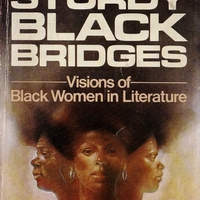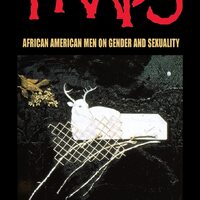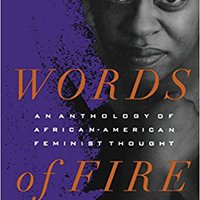-
Title
-
Words of Fire: An Anthology of African-American Feminist Thought
-
This edition
-
"Words of Fire: An Anthology of African-American Feminist Thought" . Ed. Beverly Guy-Sheftall. New York: New Press, 1995. xxvi+577 pp.
-
Table of contents
-
• Beverly Guy-Sheftall / Introduction: The Evolution of Feminist Consciousness among African American Women
Chapter One: Beginnings: In Defense of Our Race and Sex, 1831-1900
• Beverly Guy-Sheftall / Introduction
• Maria Miller Stewart / Religion and the Pure Principles of Morality, the Sure Foundation on Which We Must Build
• Maria Miller Stewrat / Lecture Delivered at the Franklin Hall
• Sojourner Truth / Woman's Rights
• Sojourner Truth / When Woman Gets Her Rights Man Will Be Right
• Frances Ellen Watkins Harper / Woman's Political Future
• Anna Julia Cooper / The Status of Woman in America
• Julia A. J. Foote / Women in the Gospel
• Gertrude Bustill Mossell / The Opposite Point of View
• Gertrude Bustill Mossell / A Lofty Study
• Mary Church Terrell / The Progress of Colored Women
• Ida Wells-Barnett / Lynch Law in America
Chapter Two: Triumph and Tribulation: Defining Black Womanhood, 1920-1957
• Beverly Guy-Sheftall / Introduction
• Elise Johnson McDougald / The Struggle of Negro Women for Sex and Race Emancipation
• Alice Dunbar-Nelson / The Negro Woman and the Ballot
• Ula Taylor / Introduction [to Amy Jacques Garvey]
• Amy Jacques Garvey / Our Women Getting into the Larger Life
• Amy Jacques Garvey / Women as Leaders
• Sadie Tanner Mosell Alexander / Negro Women in Our Economic Life
• Florence "Flo" Kennedy / A Comparative Study: Accentuating the Similarities of the Societal Position of Women and Negroes
• Claudia Jones / An End to the Neglect of the Problems of the Negro Woman!
• Margaret B. Wilkerson / Introduction [to Lorraine Hansberry]
• Lorraine Hansberry / Simone de Beauvoir and 'The Second Sex': An American Commentary
Chapter Three: Civil Rights and Women's Liberation: Racial/Sexual Politics in the Angry Decades
• Beverly Guy-Sheftall / Introduction
• Frances Beale / Double Jeopardy: To Be Black and Female
• Mary Ann Weathers / An Argument for Black Women's Liberation as a Revolutionary Force
• Linda La Rue / The Black Movement and Women's Liberation
• Patricia Haden, Donna Middleton, and Patricia Robinson / A Historical and Critical Essay for Black Women
• Pauli Murray / The Liberation of Black Women
• Angela Davis / Reflections on the Black Woman's Role in the Community of Slaves
• Michele Wallace / Anger in Isolation: A Black Feminist's Search for Sisterhood
Chapter Four: Beyond the Margins: Black Women Claiming Feminism
• Beverly Guy-Sheftall / Introduction
• The Combahee River Collective / A Black Feminist Statement
• Cheryl Clarke / Lesbianism: An Act of Resistance
• Barbara Smith / Some Home Truths on the Contemporary Black Feminist Movement
• bell hooks / Black Women: Shaping Feminist Theory
• Audre Lorde / Age, Race, Class, and Sex: Women Redefining Difference
• Deborah K. King / Multiple Jeopardy, Multiple Consciousness: The Context of Black Feminist Ideology
• Jacquelyn Grant / Black Theology and the Black Woman
• Patricia Hill Collins / The Social Construction of Black Feminist Thought
Chapter Five: The Body Politic: Sexuality, Violence, and Reproduction
• Beverly Guy-Sheftall / Introduction
• Barbara Omolade / Hearts of Darkness
• Darlene Clark Hine / Rape and the Inner Lives of Black Women in the Middle West: Preliminary Thoughts on the Culture of Dissemblance
• Shirley Chisholm / Facing the Abortion Question
• Beth E. Richie / Battered Black Women: A Challenge for the Black Community
• June Jordan / A New Politics of Sexuality
• Paula Giddings / The Last Taboo
• Pearl Cleage / What Can I Say
• Evelynn Hammonds / Missing Persons: African American Women, AIDS, and the History of Disease
Chapter Six: Reading the Academy
• Beverly Guy-Sheftall / Introduction
• Margaret Walker Alexander / Black Women in Academia
• Gloria Joseph / Black Feminist Pedagogy and Schooling in Capitalist White America
• Elizabeth Higginbotham / Designing an Inclusive Curriculum: Bringing All Women into the Core
Chapter Seven: Discourses of Resistance: Interrogating Black Nationalist Ideologies
• Beverly Guy-Sheftall / Introduction
• Pauline Terrelonge / Feminist Consciousness and Black Women
• E. Frances White / Africa on My Mind: Gender, Counterdiscourse, and African American Nationalism
• Barbara Ransby and Tracye Matthews / Black Popular Culture and the Transcendence of Patriarchal Illusions
• Alice Walker / In the Closet of the Soul
• Johnnetta B. Cole / Epilogue
Selected Bibliography
Index
-
Reviews and notices of anthology
-
• Bryant, Janice K. "Opinions on Current Reading: Black Women Speak Their Minds: Words of Fire." "Journal of Blacks in Higher Education" issue 10 (Winter 1995/1996): 111.
"Guy-Sheftall had a good idea; we need to be aware that we have so many black feminist intellectuals. And they're growing and changing with the rest of the world. Thanks to the Hill-Thomas debacle, black women have lately been accorded an even wider audience. The October 1995 Million Man March and its stay-at-home directive to women practically made it mandatory for African-American women to make their voices heard.
"But there's a 'new vanguard' of black feminists on the scene who have started an alarming trend: they don't see racism in the same light as the 'race women' of earlier times. This new wave doesn't even approve of the way African-American foremothers dealt with it. A member of this new black feminist elite, Kristal Brent Zook, has said: 'Growing up after civil rights, women's lib and the sexual revolution, my generation of black woman is not necessarily obsessed with the Man in the same ways that the old guard was. Many of us live among, and even love, white people. . . . We do not easily side with "good race women" who sacrifice their own complexities in the interest of blind race unity" ["New York Times Magazine" 12 Nov. 1995: 88].
"Is Zook too naive (or ignorant) to realize that it was those sacrifices that enable her to sit as visiting assistant professor at the Center for African-American Studies at the University of California at Los Angeles? And do the black feminist intellectuals of 'Words of Fire' have anything to say to this so-called new vanguard?
"In this regard, fortunately, they do. Gloria Joseph's 'Black Feminist Pedagogy and Schooling in Capitalist White America' speaks to some of those same confused black students who 'frequently describe experiences of blatant racial discrimination, then in Yuppie tones declare that "everyone is equal, racial differences don't really matter, you can make it if you try hard enough."' Zook et al. may reject the notion of a single black identity, but the world does not."
"With the exception of the account of Sojourner Truth siding with white feminism against black abolitionists over the question of black men versus women getting the vote, the anthology is a solid refutation of feminism as espoused by white women."
"Guy-Sheftall's black feminist intellectual point of view, in and of itself, is a noble one. But its somber air raises the question, 'Although "Words of Fire" is going to be used as a textbook, could it have been a more pleasurable read?" . . . Guy-Sheftall says that her writers show us a world in which divisions will no longer be viable. With all due respect to {Margaret Walker] Alexander, whose tremendous contributions must be acknowledged, that world is certainly not in Alexander's essay. Our mothers have been slaves, sharecroppers, laundresses, maids -- they have done body-breaking, grueling, heartless, mindless work. Alexander's essay is the most vitriolic account of a black woman's life that this reader has ever encountered. It is one of the book's most engaging, though, because it comes from Alexander's heart. It is not a good illustration of intellectual feminist thought, but it's too bad that 'Words of Fire' doesn't contain more essays like it."
-
Commentary on anthology
-
• Lee, Valerie. “Anthologizing and Theorizing Black Women’s Studies.” Signs 35.4 (2010): 788-96.
"['Words of Fire' (1995)] brought me back to why I was doing women's studies. It gave me hope and renewed my promise to keep black feminist criticism at the forefront of my teaching and scholarship. With the publication of 'Words of Fire', I discovered that as a precursor to teaching Virginia Woolf's 'A Room of One's Own' (1929), I could teach Gertrude Mossell's 'A Lofty Study' ([1894] 1995), an essay that makes the same argument well in advance of Woolf's. And, as evident in 'Words of Fire', along with Mary Wollstonecraft's often-anthologized 'A Vindication of the Rights of Woman' ([1792] 1967), Maria Stewart also vindicated the rights of a woman by delivering a lecture on black women's rights at Franklin Hall in Boston in 1832. Addressing her 'fairer sisters,' Stewart proclaimed, 'Had we had the opportunities you have had, to improve our moral and mental faculties, what would have hindered our intellects from being as bright, and our manners from being as dignified as yours?' ([1832] 1995, 32). 'Words of Fire' rekindled the embers of the history of Western feminism for me" (791).
-
See also
-
• "Interview with Beverly Guy-Sheftall." "Archives of Justice" 7 June 2015. Web.
-
Archives of Justice
-
• Pitts, Steven, and Sheri Davis. "Episode 10: Beverly Guy-Sheftall." "Black Work Talk" Apple podcasts. 21 April 2022. 1 hr 20 min.
-
Black Work Talk (Apple podcasts)
-
"This episode launches Black Work Talk’s mini-series on Black feminism. Steven Pitts’ co-host for this mini-series is Sheri Davis, Associate Director, Center for Innovation in Worker Organization (CIWO) at Rutgers University. We talk with Beverly Guy-Sheftall, Professor of Women's Studies and English at Spelman College. Beverly has been at the center of most developments of Black feminist thought since the mid-1970s and her anthology, Words of Fire: An Anthology of African-American Feminist Thought, is a foundational collection. During this episode, the three of us discussed the interconnection of oppressions (around race, gender, class, sexual identity) which is at the core of Black feminism. We also talked about the power of Black feminist approach to increase the quality of worker organizing."
-
• Other anthologies co-edited by Beverly Guy-Sheftall:
-
 Sturdy Black Bridges: Visions of Black Women in Literature
Sturdy Black Bridges: Visions of Black Women in Literature
-
 Traps: African American Men on Gender and Sexuality
Traps: African American Men on Gender and Sexuality
-
Cited in
-
not in Kinnamon 1997]
-
Item Number
-
A0298
 Sturdy Black Bridges: Visions of Black Women in Literature
Sturdy Black Bridges: Visions of Black Women in Literature
 Traps: African American Men on Gender and Sexuality
Traps: African American Men on Gender and Sexuality
 Front cover
Front cover